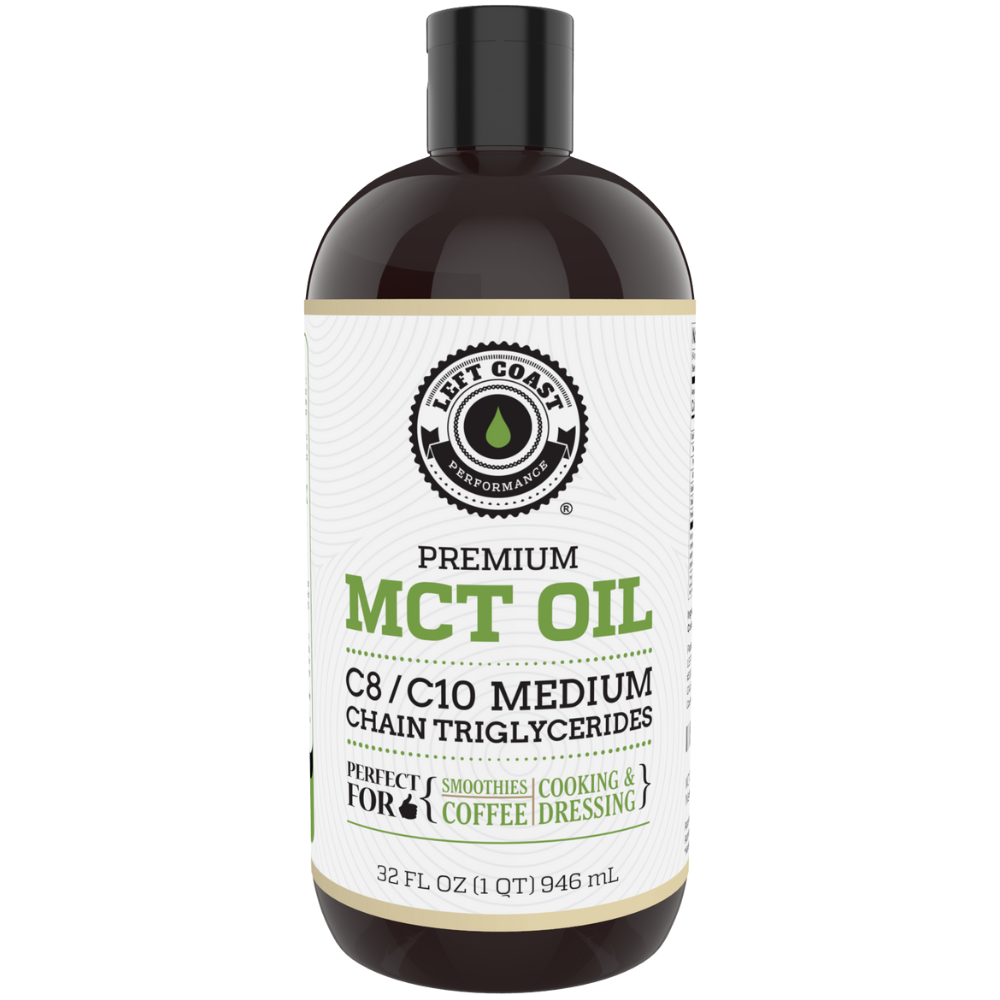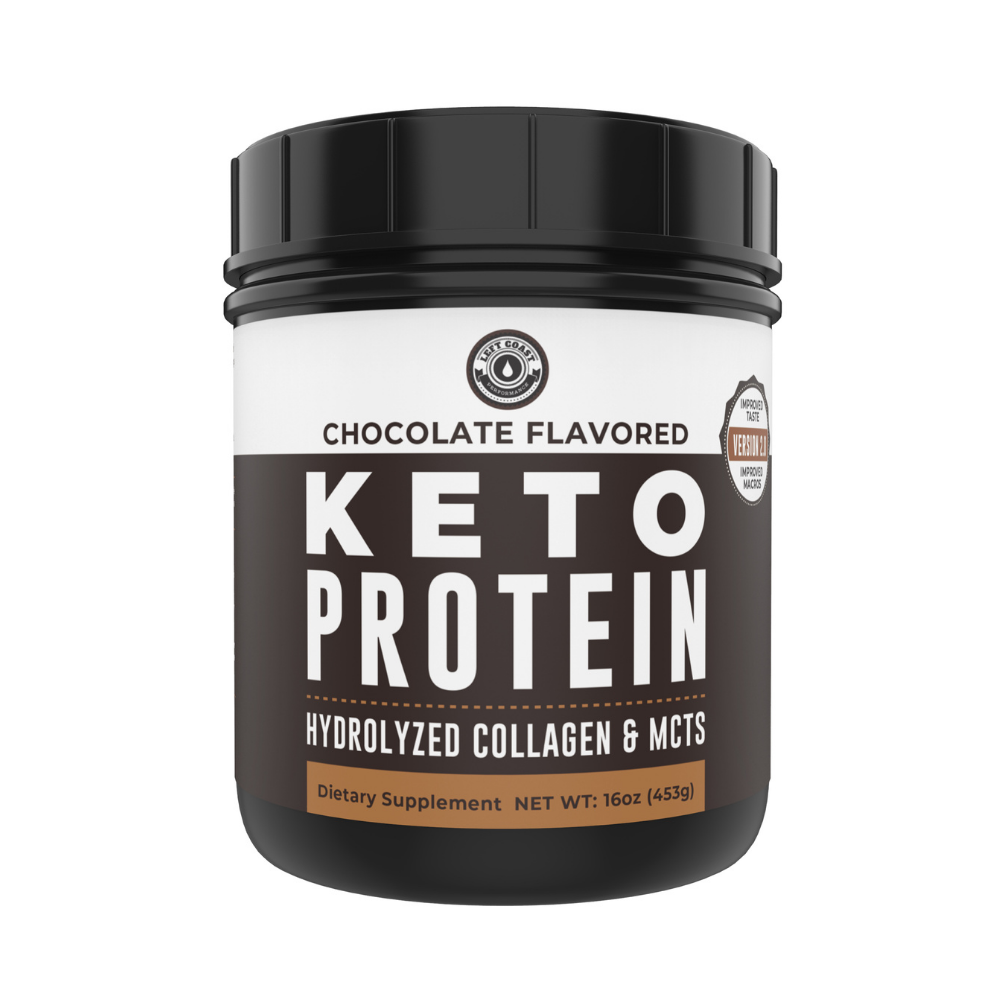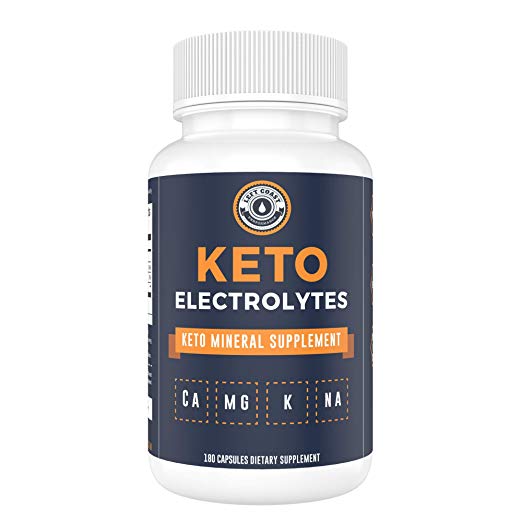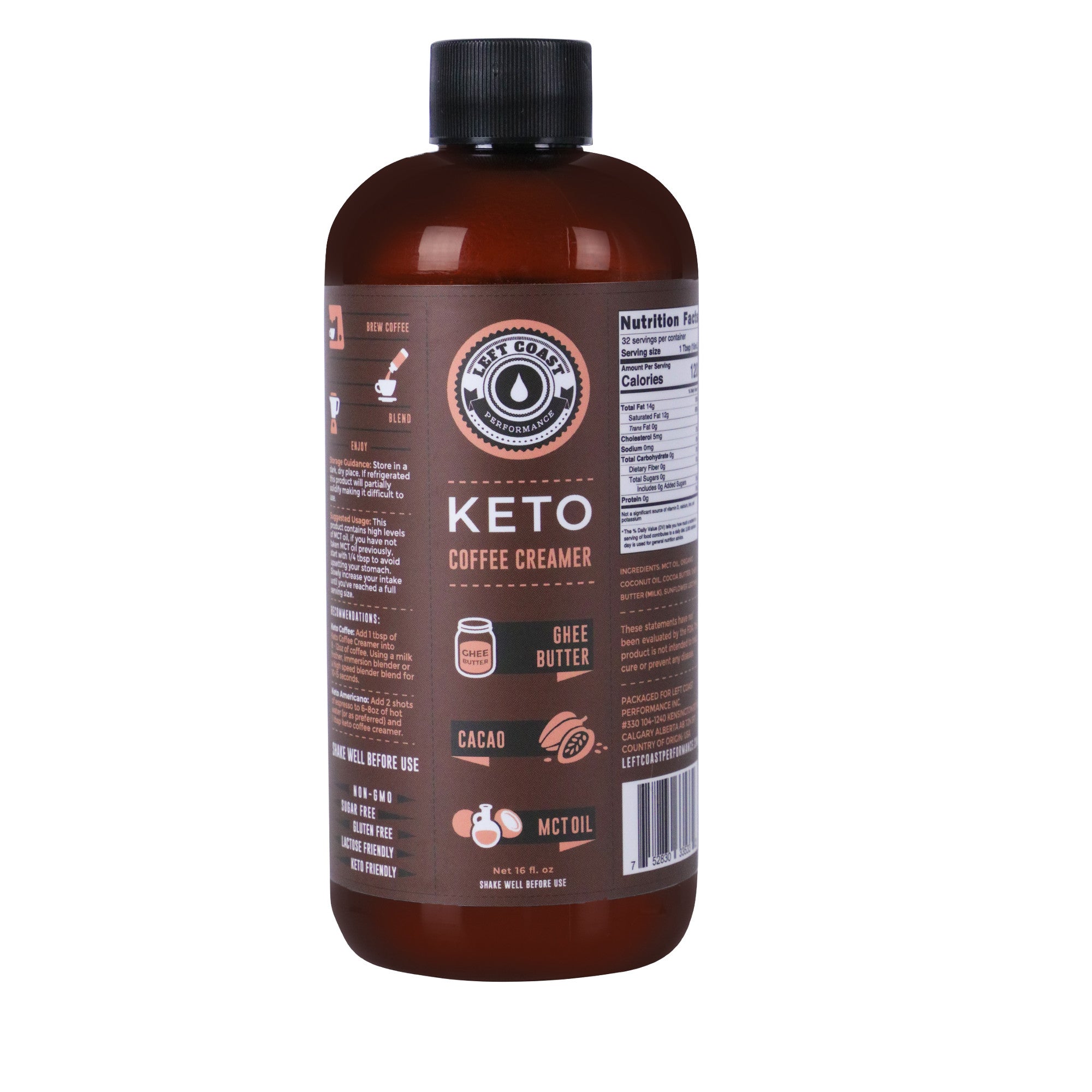How to Use MCT Oil While Intermittent Fasting
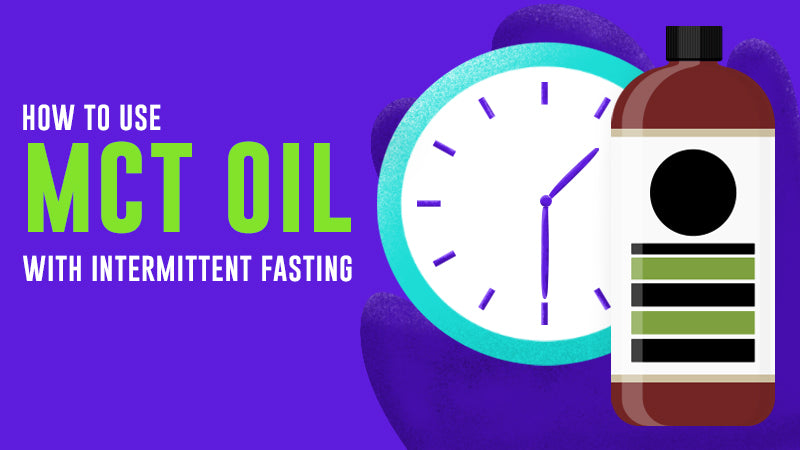
on November 12, 2019
Intermittent fasting is a popular eating habit to promote weight loss, increase longevity, and jump-start ketosis. There are many different types of intermittent fasting techniques, but they all center around controlling the ratios between fasted and non-fasted (eating) times.
One of the hardest aspects of adhering to any fast is warding off hunger. MCT (medium-chain triglyceride) oil is an often recommended supplement to support a ketogenic diet and intermittent fasting practices.
In this article, we’ll get into the benefits of MCT oil, how to source high-quality oil and ways you can use MCT oil while intermittent fasting.
What is MCT Oil?
MCT or medium-chain-triglycerides are a classification of fat and they've become a popular supplement in a keto diet.
Due to their chemical structure, MCTs are metabolized differently from other fats. They’re converted immediately into ketones for energy, not stored like other fats.
“Medium-chain” comes from the number of carbon molecules they contain. There are four types of fats that are considered MCTs and contain between 6 and 12 carbon molecules:
- Caproic acid (C6): 6 carbon molecules
- Caprylic acid (C8): 8 carbon molecules
- Capric acid (C10): 10 carbon molecules
- Lauric acid (C12): 12 carbon molecules
Caprylic and capric acid are the two MCTs the body most easily uses for energy.
Adding these fats to your diet with MCT oil supplements may be beneficial if you are fasting as they can help reduce hunger and fatigue, allowing you to extend your fast.
MCTs have other health benefits in addition to giving you an energy boost. These include:
- Improved insulin sensitivity
- Reduces acne breakouts
- Speed up metabolism
- Improve memory and support brain health
- Antifungal and antibacterial properties.
- Helps maintain gut health
- Improves exercise performance
- Supports healthy cholesterol levels
As you can see, MCT oil has multiple benefits and can be a healthy addition to your daily routine.
What Is Intermittent Fasting?
Intermittent fasting (IF) is a popular diet trend that involves periods of not eating. The amount of time spent fasting can vary from just 12 hours overnight to a day or longer.
Although it seems that IF has just come onto the scene, people have been fasting for centuries either for medical or religious reasons. Fasting for health is nothing new.
Currently, IF is promoted as a simple and effective way to lose weight — It helps you drastically reduce caloric intake, which may, in turn, result in weight loss.
Here are a few benefits of intermittent fasting beyond weight loss:
- Helps you reach ketosis faster
- Lowers blood pressure
- Improves insulin sensitivity
- Reduces inflammation and oxidative stress
- Decreases blood lipids such as total cholesterol and triglycerides
- Supports brain health
- May lower risk of cancer
- May increase longevity
All of these health benefits are due to an underlying mechanism called autophagy. Autophagy is the way the body “cleans” its cells. “Auto” means self, and “phage” means to eat.
This process is the body’s way of removing dysfunctional cells, repairing those that are damaged, and recycling unnecessary parts. When the body can clean up any damage, it can naturally self-heal and remove harmful cells that could turn cancerous or cause disease.
The best way to induce autophagy is by fasting. By not eating for a period of time, the body can divert energy towards repair, instead of digestion.
The ketogenic diet is another way to trigger autophagy.
Ketosis initiates autophagy because when insulin levels are low, levels of a hormone called glucagon are high. Elevated glucagon is a sign that the body should initiate autophagy.
Although fasting is beneficial for promoting fat burning, the advantages go way beyond just helping you lose weight. It allows your body to repair and reset due to autophagy, which may lower your risk of chronic disease.
Three Common Types of Fasting
If you want to add MCTs to your fasting routine, there are a few things to keep in mind.
First, let’s discuss the three main types of intermittent fasting and how to decide which is right for you.
1. True fast
A true fast is a fast where you consume no calories, except water — which is calorie-free — for anywhere between a 12 - 24-hour fasting window. Extending a true fast beyond 24 hours may be quite challenging and dangeorus.
2. Fasting with low-calorie drinks
This type of fast is more flexible, where black tea and coffee with a splash of milk is allowed. Having your morning coffee can improve satiety, prolonging your fasting period. The general recommendation is to keep the additives to your drinks below 50 calories — But, there is no rhyme or reason behind the specific amount of calories.
It seems like 50 calories is an acceptable rule of thumb to maintain your fasted state amongst the experts. A tablespoon of MCT oil contains 126 calories, so in theory, you can add one teaspoon (42 calories) of MCT oil to your coffee or tea without breaking your fast.
If you must add something to sweeten your coffee, you can add a sprinkle of a low-calorie sweetener. However, pay attention to your choice of sweetener as some may affect blood sugar levels or intensify sugar cravings.
Stevia is zero carb and zero calories and won't cause an insulin response, so it's a safe sweetener for your morning coffee.
3. Fat fasting
Fat fasting is not a traditional fast, but it is a technique many keto dieters use to get into ketosis faster and to promote fat loss.
It involves eating a very high percentage of calories from fat alone while restricting overall calorie intake to push the body into ketosis within a few days.
It may also involve a strict 12 - 16-hour fasting window before breaking the fast with bulletproof coffee made with grass-fed butter and MCT oil. Fueled with caffeine and healthy fats, this will allow you to delay a solid meal for 2 - 4 hours after the coffee and may improve your mental clarity in the morning.
Choosing an MCT Oil for Fasting
Most MCT oils are either a blend of caprylic and capric acid or just one of these oils. They’re made from coconut or palm oil. The higher quality MCT oils are made from coconut oil and are a blend of C8 and C10 with little o no C12.
Coconut oil is mostly lauric acid, which may not have the same health benefits as caprylic and capric acid. Although you could use coconut oil for fasting, it’s not as satiating and may not help you extend your fast.
For fat fasting, stick with a high-quality MCT oil made from coconut.
MCT oil comes in either an oil or powder. Oil is the “purest” available but can be messy to handle and is not easily transportable. The powder is easy to transport but may contain undesirable fillers, so read the labels carefully.
Which Intermittent Fasting Type is Right For You?
Choosing the right fast depends on your goals. The most benefit for overall health and weight loss will come from a strict fast. However, it’s difficult to maintain for an extended period of time.
A strict fast is not recommended for longer than 24 - 72 hours due to the possibility of nutritional deficiency.
That being said, your fasting period doesn't need to be extreme — most people can still get significant benefits from strict fasting for 12 - 16 hours.
For those who are fasting strictly for weight loss, flexible fasting with low-calorie drinks is likely to give you the results you are looking for and can help you extend your fast.
Consider adding a teaspoon of MCT oil to your coffee or tea for the extra weight loss benefits.
Fat fasting may help you get into ketosis faster, so you may want to consider it when you are transitioning into following a ketogenic diet.
Many keto dieters find they lose weight quickly in the first week of a fat fast. This may be due to water loss and a result of restricting calories. On a side note, if you find you’ve plateaued after the first couple weeks, there are several tips to get you out of this keto plateau and get you back on track to losing weight.
Be aware that bulletproof coffee has around 400 - 500 calories, and calories still do count on keto. Beyond the first week, if you continue to eat too many calories, you will not see results.
Risks Associated with Intermittent Fasting
Extended fasting for longer periods may increase the risk of kidney and heart problems. Fasting is not for everyone; pregnant or lactating women or people with diabetes or other health conditions should not fast.
If you’re taking medications or are following a ketogenic diet to manage a disease, it’s also best not to fast before speaking to your doctor.
Even if you are generally healthy, if at any time you feel dizzy or lightheaded, it’s best to break your fast. Always drink plenty of water during any fast to make sure you stay well-hydrated.
Does Bulletproof Coffee Break a Fast?
While black coffee won't break your fast. The consumption of any calories will technically break your fast. It doesn’t matter if the calories are from MCT oil or butter in the bulletproof coffee.
As mentioned, the “50 calories” rule doesn’t have substantial backing in science. It just seems to be the protocol that online “experts” have experimented with and decided to follow.
The benefits of fasting that we have discussed, like autophagy, will likely be nullified with the consumption of any calories because the body will still have to divert energy to digest the fats.
But, not all is lost. Fasting with MCT oil or bulletproof coffee will help you remain in ketosis. Having a few calories during your fasting window will also help extend your fasted state.
The more time you spend fasting, the fewer calories you will eat, and you will lose weight. Studies have found that people tend to not overcompensate by eating more calories after a fast.
Consider Using MCT Oil For Intermittent Fasting For Weight Loss
MCT oil can be a beneficial and helpful addition to your fasting protocol if your main goal is weight loss. Be sure you limit your overall consumption of MCT oil to keep your calories under control.
If you’re fasting for the other health benefits, it’s probably best to skip MCT oil. With fasting, it doesn’t have to be all or nothing. You can do a strict fast one day and a fat fast the next, just experiment to find what works best for you.






